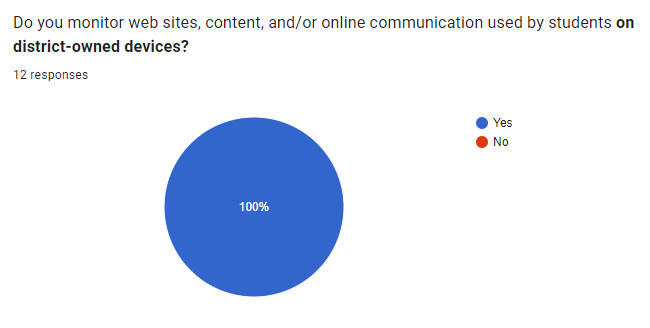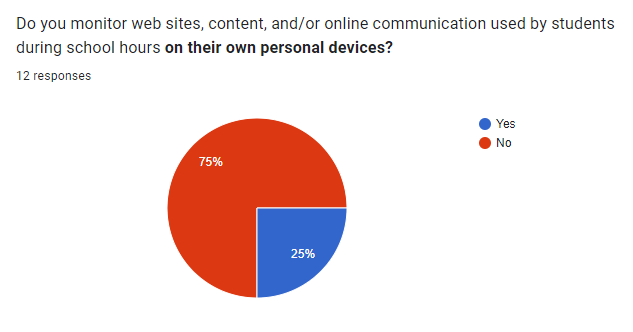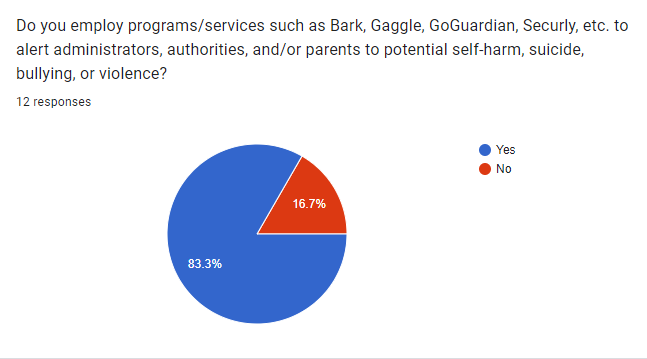There's a good chance your child's school is tracking every keystroke of their electronic lives.
Schools say it's for safety.
Critics fear it may cause more harm than good.
This week on KMOX we hear the pros and cons of student monitoring with Virtual Consumer Editor Megan Lynch.
Listen to Part 1 of KMOX's Report on student surveillance
"Most students don't actually know that they're being surveilled," says Rachel Franz, Education Manager at Fairplay, a nonprofit skeptical of the "promises of big tech". Surveys show an increasing number of school districts are deploying programs to monitor what students do online.
That has Franz and others pulling the alarm. "When it comes to your child's safety online, this type of surveillance is not necessary to keep them safe"
Watchdogs argue this type of electronic oversight is an overreach. They say it's treading on the rights of students. That it's creating an atmosphere that could actually hamper learning.
At the same time, educators are struggling to address a mental health crisis.
Schools face continued threats of violence -- tragedy in their halls. Like the morning of October 24th, 2023, when a shooter entered a St. Louis high school with 600 rounds of ammunition, killing a student and teacher.
To try and avert another crisis, districts are turning to outside tech companies. Schools in the St. Louis region tell KMOX they're paying anywhere from $30,000 to $95,000 a year for online monitoring services.
In return these companies promise to shield students from harmful content and to identify young people at risk.
How do they do it?
- Some block websites.
- Others allow teachers to see and even shut down what's happening on a student's device
- Many use algorithms to flag words that might indicate a child is in crisis or contemplating harm.
Only one of these companies agreed to talk to KMOX for our reports.
"Bark is technology that helps keep children safer online and in real life," explains Titania Jordon, Chief Parenting Officer with Bark Technologies. The company boasts millions of interventions in cases involving bullying and self-harm, "the rate at which children are experiencing cyberbullying, online predation, suicidal ideation, drug and alcohol content, body image and eating disorder issues -- they're all increasing and that's a problem."
Bark started as a platform for parents to monitor what their children were doing on their personal electronic devices. Now Jordan says Bark is used by more than 3300 school districts in the United States. "Every day at Bark we are sending right now, the average is around 100 severe self harm and suicidal ideation alerts each day across parent product and school product. That's really sobering." One of Bark's success stories -- it's software detected an online predator from Europe, trying to lure middle school girls into sending sexually explicit photos through an app.
Jordan stresses, they don't want to be considered spyware, "we don't recommend you using Bark without informing the children you're using it, whether you're the parent or you're the school system."
If you haven't heard of Bark, what about Gaggle, GoGuardian, Securly or LineWize??
Elizabeth Laird is with the Center for Democracy and Technology, "We found 1 in 5 parents were unsure if their schools used this technology"
You can pretty much bet your school is using some form of digital control.
KMOX sent a survey to districts in the St. Louis region. Many were forthcoming with information for our reports.
Here's what we learned:
ALL of the schools that responded to our survey say they monitor web sites, content, or online communication by students on district-owned devices.

Some even monitor what happens on students' personal devices, during school hours.

More than 80% of schools tell KMOX they are using programs that send administrators alerts. That means they actively scan what students do on their keyboard, keypad and mouse. If that online surveillance suggests there's a risk of self-harm, suicide, bullying, or violence, the software will alert administrators and possible even law enforcement officials.

Is it a lifeline, or have educators crossed the line? We explore those issues this week on KMOX. Tuesday hear from two school districts that have very different philosophies on monitoring student content.
